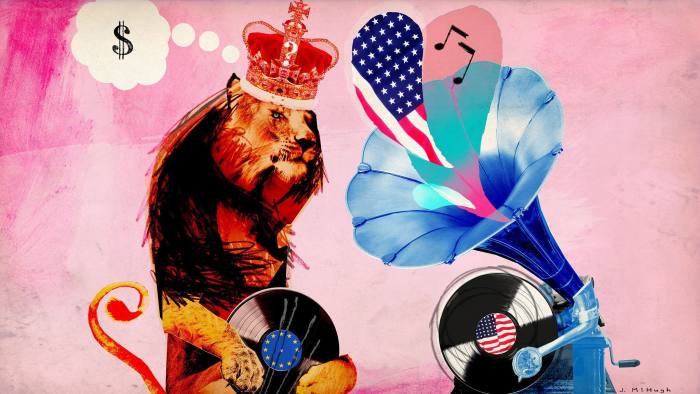Trump lays bare Britain’s ‘special relationship’ delusion
Tensions between London and Washington are nothing new
Lawrence Freedman

That Britain is a country “in turmoil” is one of US president Donald Trump’s more accurate observations. It is a turmoil to which he contributes. Instead of offering a beleaguered UK prime minister a helping hand, he has added to Theresa May’s woes by blatantly encouraging her most hardline Brexit critics. Mrs May finds herself having to cope with enormous strains in the two relationships at the heart of Britain’s foreign policy: with the US and with Europe.
This is not a wholly unique situation. In early December 1962, as Britain’s first attempt to join what was then the “common market” was about to fail, former US secretary of state Dean Acheson noted that Britain “had lost an empire but failed to find a role”. This unhelpfully set in motion a quest for that special role. Finding it became the holy grail of British foreign policy.
The search focused on Britain’s relationship with the US. The Suez crisis of 1956 had demonstrated in a humiliating manner that Britain could no longer pursue ambitious policies against American wishes. Just before Acheson’s speech, the Pentagon had decided to abandon the Skybolt missile upon which the future of Britain’s nuclear strike force depended. It took an emergency summit between prime minister Harold Macmillan and president John Kennedy for the US to substitute the much more appropriate Polaris missile. The episode underscored the extent to which Britain’s strategic independence had been compromised.
Macmillan had already decided, post-Suez, that the only way to sustain any position in the world was to stay as close as possible to the US. In this way, shared history and culture, along with the security connections forged during the second world war, could keep Britain centre stage. The country may not have found a special role, but it did have a special relationship.
Britain was clearly the junior partner, although at times London flattered itself that it could make up for a lack of raw power by using its mature wisdom to guide the brash newcomer. But there was also a solid foundation. The intense co-operation between diplomats, military staffs, intelligence agencies and nuclear establishments worked to the benefit of both. The two also had similar world views and were fully embedded in the network of multilateral institutions set up after the war to keep the international system as orderly as possible.
Most importantly, the relationship stayed so close because a series of great causes held it together. Following the joint fight against the Nazis — the greatest cause of all — this sense of shared endeavour was sustained through the cold war. Then with the collapse of the Soviet Union came more positive opportunities to spread western values and practices in eastern Europe and beyond. This was followed by the darker period of the “war on terror”.
These great causes did not prevent disagreement. Even during the 1980s, when Margaret Thatcher and Ronald Reagan were on a shared ideological campaign, they had their differences, for example over the Falkland Islands in 1982. Yet the Falklands episode also indicated the underlying strength of the relationship. While Thatcher was furious that Reagan sought a deal between the Argentine aggressor and his aggrieved ally, the Pentagon and American intelligence agencies were actively working to make sure that British forces had the support they needed.
Tony Blair declared after the al-Qaeda attacks of September 11, 2001 that the UK would stand “shoulder-to-shoulder” with the US. He set himself up as a committed strategic adviser to president George W Bush, even when this led to the invasion of Iraq. The episode illustrated the limits of the alliance. Mr Blair could exercise some influence when the White House was undecided about what to do, but he could not get it to budge once it had made up its mind up. The result was that Britain found itself part of an ill-prepared and much-criticised occupation.
This left a legacy. There was little appetite for new operations of a similar kind, other than the occasional use of air power. David Cameron’s failure to get parliament to back a military response to Syria’s use of chemical weapons in September 2013, and Barack Obama’s own reluctance to get involved in another ground war in the Middle East, marked the end of this activist stage in the special relationship.
Weariness replaced the confidence with which the 21st century had begun. The international order that had served the interests of the two countries so well was under challenge from critics at home as well as abroad. The UK’s vote to leave the EU was one symptom of this challenge; Mr Trump’s election another. There was even a theoretical possibility of a new stage in the special relationship marked by the two working together outside the multilateral institutions that they had both worked so hard to develop and sustain.
But Mrs May has never been able to bring herself to support the radical break with the past that Mr Trump represents. On every issue in which he has challenged mainstream thinking (climate change, Iran, trade), the UK has found itself on the same side as its EU partners.
Before the Brexit vote it might have been possible to compensate for Mr Trump’s unpredictability with a more active role in the EU, but that is no longer available. A country whose role in the world always depended on the quality of its partnerships with others now faces an unusually lonely future. To lose one special relationship is a misfortune; to lose two together looks like carelessness.
The writer is emeritus professor of war studies at King’s College London and author of ‘The Future of War: A History’
0 comments:
Publicar un comentario